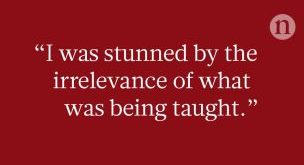from Lars Syll We certainly agree that regularities or models that explain or that give heuristic value over many different cases are highly desirable. But ones that do neither are not — especially if they use up huge resources along the way. When looking at the details, the Prisoner’s Dilemma’s explanatory record so far is poor and its heuristic record mixed at best. The only way to get a reliable sense of what theoretical input would actually be useful is via detailed empirical...
Read More »Internalizing “externalities”
from Victor Beker and RWER issue 106 There was a time when it was thought that the main task of economics was to assure economic growth. For example, John M. Keynes predicted that “the day is not far off when the Economic Problem will take the back seat where it belongs” (Keynes 1931: 6). Then, once scarcity has been overcome, mankind would devote most of its efforts to real problems, the problems of life and human relations (ibid,). The impact of economic growth on the Earth environment...
Read More »The end of IVF in Alabama?
One of the corollaries to the “life begins at conception” view is that all zygotes created by in vitro fertilization are fully human, so their deliberate destruction is ipso facto murder. This would effectively end IVF, since most zygotes will never be implanted. So sayeth the Alabama Supreme Court:“An embryo created through in-vitro fertilization (IVF) is a child protected by Alabama’s wrongful death act and the Alabama Constitution, the Alabama...
Read More »Κυριακή 18 Φεβρουαρίου, 6:30 μ.μ. – Διαδικτυακή Εκδήλωση της Δ.Ο.Ε. «Όροι διαβίωσης και συνθήκες εργασίας των εκπαιδευτικών. Η επίδρασή τους στην εκπαιδευτική διαδικασία»
Την Κυριακή 18 Φεβρουαρίου, 6:30 μ.μ. η Δ.Ο.Ε. (Διδασκαλική Ομοσπονδία Ελλάδας) πραγματοποιεί διαδικτυακή εκδήλωση με θέμα «Οι όροι διαβίωσης και οι συνθήκες εργασίας των εκπαιδευτικών. Η επίδρασή τους στην εκπαιδευτική διαδικασία, τη διδασκαλία και τη μάθηση». Εισηγητές: 1.Σταύρος Μαυρουδέας, Καθηγητής Τμήματος Κοινωνικής Πολιτικής του Παντείου Πανεπιστημίου. 2. Βασίλης Τσάφος, Καθηγητής του Τμήματος Εκπαίδευσης και Αγωγής στην Προσχολική Ηλικία του Ε.Κ.Π.Α. 3. Απόστολος...
Read More »“I object to the question on which this volume focuses.”
from Richard Norgaard and RWER issue 106 I object to the question on which this volume focuses. It assumes that biophysical limits are real and knowable rather than a human construct associated with a particular understanding of how natural systems might behave. Limits have been an extremely useful construct for critiquing the even simpler construct that assumes science and technology can provide unlimited economic growth. Nature, however, has zillions of limits that are crossed all of...
Read More »Some good news from Oz (crosspost from Crooked Timber)
Over the last few years, the Australian and UK Labor/Labour[1] parties, have followed strikingly parallel paths. A better-than expected result with a relatively progressive platform (Oz 2016, UK 2017) A demoralizing defeat in 2019, followed by the election of a new more conservative leader (Albanese, Starmer) Wholesale abandonment of the program Failure of the rightwing government to handle Covid and other problmes Because we have elections every three years, Australia is...
Read More »Why economics is an impossible science
from Lars Syll In a word, Economics is an Impossible Science because by its own definition the determining conditions of the economy are not economic: they are “exogenous.” Supposedly a science of things, it is by definition without substance, being rather a mode of behavior: the application of scarce means to alternative ends so as to achieve the greatest possible satisfaction—neither means, ends, nor satisfaction substantially specified. Exogenous, however, is the culture, all those...
Read More »Europe’s foreign policy has been hacked and the consequences are dire
Europe’s foreign policy has been hacked and captured by US Neocon interests. That capture poses a dire threat to both European democracy and global security. The threat to global security is because Europe is now captive in the US Neocon war on China and Russia. The threat to democracy comes from European voters gradually intuiting […]
Read More »Introducing nonlinear and non-equilibrium perspectives into ecological economics
from Ping Chen and RWER issue 107 Economic Complexity vs. Neoclassical Simplicity Complexity science originated from astrophysics when Henri Poincaré discovered the three-body problem had no analytical solution in 1899. The discovery and development of deterministic chaos in the 1960s to 1990s found wide evidence that nonlinear deterministic systems only have limited predictability. Ilya Prigogine further recognized the important role of irreversibility in biological evolution since...
Read More »For corporations, greed is good – so how can Australia really tackle price gouging?
My latest piece in The Guardian. The long-running debate over “price gouging” should have been settled yesterday by the release of a report by Allan Fels, the former chair of the Australian Competition and Consumer Commission (ACCC). The report, commissioned by the ACTU, found that a wide range of Australian industries are characterised by limited competition, giving powerful firms ample scope to extract large profit margins. Consistent with international evidence, most of the...
Read More » Heterodox
Heterodox




